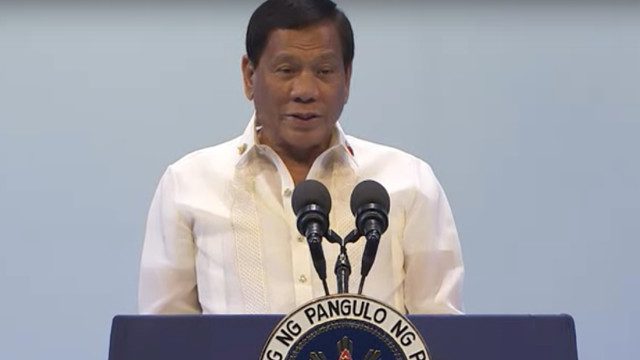SUMMARY
This is AI generated summarization, which may have errors. For context, always refer to the full article.

MANILA, Philippines – As he opened the 30th Association of Southeast Asian Nations (ASEAN) Summit in Manila, Philippine President Rodrigo Duterte underscored the need to “adhere to the supremacy of the law” in dealing with disputes between countries.
It was a soft jab at the South China Sea (West Philippine Sea) dispute which puts head to head Asian giant China and 4 ASEAN member states who all have overlapping claims in the water body.
A Hague ruling won by the Philippines against China last year stated that China flouted international laws on the sea when it claimed virtually the entire South China Sea through its 9-dash line.
“Relations also remain solid if all stakeholders learn to respect and value the peaceful resolution of disputes,” said Duterte on Saturday, April 29 in front of fellow Southeast Asian leaders.
“In an era where there can be much of uncertainty, we must faithfully adhere to the supremacy of the law and rely on the primacy of rules as responsible members of the international community,” he added.
Hard-hitting statements against China are not expected at ASEAN Summit opening speeches. All eyes and ears will be on Duterte when he delivers the ASEAN Chairman’s statement later in the day. Positions taken by ASEAN, and particularly of the country chairing the summit, will be part of the statement.
Duterte has already given signals that the Philippines’ chairmanship will go soft on China. He told reporters days before the Summit that he would not raise the Hague ruling won by the Philippines that invalidated China’s sweeping claim in the West Philippine Sea.
He said the ruling is “not an issue” of the ASEAN Summit.
Duterte also insisted he made this decision on his own, without interference from China.
“Nobody tells me what to do, what to say,” he said on Thursday, April 27.
However, there are reports that China, as it has done in other ASEAN summits, has asked the Philippines to tone down its mention of the maritime dispute in its chairman’s statement.
A watered down statement would be a win for China as it has already lost face in the international community for insisting on its 9-dash line despite the Hague ruling.
Aside from the Philippines, 3 other ASEAN countries have active claims in the South China Sea. These are Vietnam, Brunei, and Malaysia.
Duterte’s foreign policy so far has sought to appease China by leaving out any discussions of the Hague ruling in favor of warmer ties with the Asian giant.
His state visit to Beijing revived the Philippines’ diplomatic ties with China which soured during the administration of his predecessor Benigno Aquino III. It was during Aquino’s presidency that the Philippine government filed a case against China over the maritime dispute.
Under the Aquino administration, the Philippines consistently pushed for strongly worded ASEAN chairman statements and for a unified response to China’s actions, including land reclamation in the disputed sea. – Rappler.com
Add a comment
How does this make you feel?
There are no comments yet. Add your comment to start the conversation.